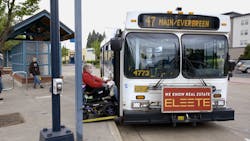TriMet’s budget adjustments due to COVID-19 focus on preserving services, jobs and safety
TriMet is adjusting its budget as the financial impacts of the COVID-19 pandemic become clearer.
TriMet says it expects to lose an estimated $63 million in revenue through June 2020, and projects a $135.4 million loss for Fiscal Year 2021, which runs from July 1, 2020 through June 30, 2021.
The nearly $185 million in funding from the federal Coronavirus Aid, Relief and Economic Security (CARES) Act allotted to TriMet will help mostly offset the current and next year losses. However, with Oregon’s economic recovery expected to take several years and based on the agency’s own projections, TriMet says it anticipates revenue impacts from the pandemic in following years.
Although federal CARES Act funds helps TriMet pay expenses currently, they are not enough to cover the full cost of responding to the COVID-19 crisis, as well as allow TriMet to expand services in the coming year. Because of that, TriMet’s service reductions put in place on April 5 remain, and the agency will take a conservative approach to adding back service. Ridership levels and revenue levels will determine how soon TriMet can return service to pre-April levels, with an emphasis on supporting disadvantaged communities.
“We want to assure riders, employees and the public that as we come back—and we will come back—we will do so while taking appropriate measures for safety,” said TriMet General Manager Doug Kelsey. “We have elevated our protocols to help riders feel comfortable on board, while also preserving jobs and service as much as possible.
TriMet has increased cleaning efforts, established physical distancing guidelines and required face-covering use by both riders and employees, following the direction of Gov. Kate Brown and the Oregon Health Authority. The agency is working to increase cleaning even more, with an aim to disinfect vehicles about every four hours during the service day.
TriMet says it has spent about $4.4 million on the elevated cleaning efforts in response to COVID-19, including cleaning supplies and devices as well as personal sanitizing and protection equipment. This includes such items as disinfectant spray and fogging machines, sanitizing wipes, hand sanitizer and face coverings for both employees and riders. It does not reflect the cost of added staff or overtime pay for the elevated cleaning. TriMet will hire more than 100 new cleaners, in addition to 30 service workers brought on in the past several weeks to help with the elevated cleaning efforts.
One item that has not changed from the approved budget is a fare increase. As was previously stated, TriMet does not plan a fare increase in Fiscal Year 2021.
Drop in ridership, revenues
The COVID-19 pandemic has led to a drop in TriMet’s main revenue sources: fares and payroll taxes. With a sharp drop in ridership from the February 2020 weekly average, nearly 70 percent at its lowest point, TriMet fare revenue was down by $20 million for FY2020, according to the agency. TriMet expects fare revenue to remain down in FY2021, by some $61 million.
While fare revenue has covered 17 percent of TriMet’s operating expenses, payroll taxes cover roughly two-thirds of operating costs. With more than 300,000 Oregonians suddenly unemployed, or one in eight, TriMet says it expects to lose about $30.5 million in projected payroll taxes for March through June 2020. The agency also expects payroll tax revenue to be $67.7 million less than anticipated in the FY2021 budget approved in March.
Strategic financial management
The CARES Act funding, plus TriMet’s strategic financial management leading up to the world health crisis, means TriMet can stave off even deeper cuts. As TriMet Executive Director of Finance and Administrative Services Dee Brookshire told the Tax Supervising and Conservation Commission, TriMet has a strong financial reputation.
“TriMet has taken a conservative approach in our budgeting and that must continue,” said Brookshire. “The CARES Act money helps TriMet for the current and upcoming budget cycles; however, if revenue declines continue, without further financial assistance, TriMet must remain careful, maintain financial flexibility and consider additional cost-cutting measures.”
Cost-cutting measures
TriMet has taken some initial steps to reduce costs even prior to formal adoption of the budget to preserve service and retain employees. In addition to the approximately 20 percent reduction in service that went into effect April 5, the agency has suspended some climate action efforts it planned for this year. TriMet has temporarily postponed plans to transition MAX light-rail system to 100 percent wind-powered electricity and the bus fleet to 100 percent renewable diesel. TriMet says it remains committed to a sustainable future and a full transition to a 100 percent non-diesel bus fleet by or before 2040. TriMet has also put a hiring freeze on non-essential positions.
Creating regional jobs
Despite cost-cutting measures, TriMet continues work on and plans for major construction projects that create regional jobs. These projects are mostly funded from a combination of long-term bonds issued prior to the COVID-19 crisis and federal resources. Currently, the Division Transit Project is underway in Southeast Portland and Gresham, which will create some 1,400 jobs over the life of the project. TriMet is also planning the Steel Bridge MAX Improvements project that will essentially rebuild the MAX system on the bridge this August. This will support some 450 jobs, improve safety and increase the speed and reliability of the MAX system. The agency is also planning major projects to extend the MAX Red Line and improve the existing light-rail system, which is anticipated to create 1,200 jobs. Work continues on the planning for expanding the light-rail system through the Southwest Corridor, creating an estimated 28,000 jobs.

